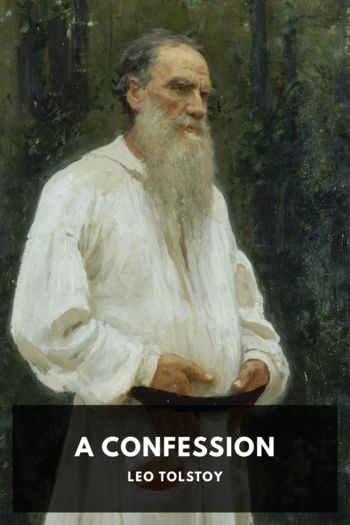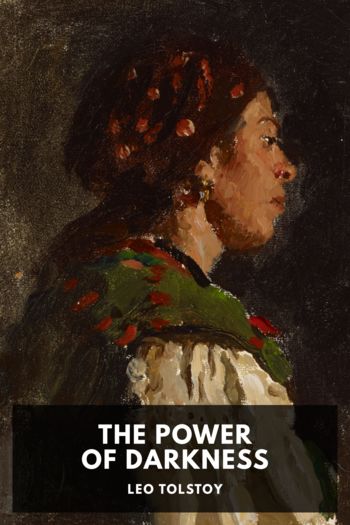Resurrection by Leo Tolstoy (best sci fi novels of all time TXT) 📕

- Author: Leo Tolstoy
Book online «Resurrection by Leo Tolstoy (best sci fi novels of all time TXT) 📕». Author Leo Tolstoy
“Yes, and to marry her if she wishes it.”
“Dear me! But if you do not object I should like to ask you to explain your motives. I do not understand them.”
“My motives are that this woman—that this woman’s first step on her way to degradation—” Nekhlúdoff got angry with himself, and was unable to find the right expression. “My motives are that I am the guilty one, and she gets the punishment.”
“If she is being punished she cannot be innocent, either.”
“She is quite innocent.” And Nekhlúdoff related the whole incident with unnecessary warmth.
“Yes, that was a case of carelessness on the part of the president, the result of which was a thoughtless answer on the part of the jury; but there is the Senate for cases like that.”
“The Senate has rejected the appeal.”
“Well, if the Senate has rejected it, there cannot have been sufficient reasons for an appeal,” said Rogózhinsky, evidently sharing the prevailing opinion that truth is the product of judicial decrees. “The Senate cannot enter into the question on its merits. If there is a real mistake, the Emperor should be petitioned.”
“That has been done, but there is no probability of success. They will apply to the Department of the Ministry, the Department will consult the Senate, the Senate will repeat its decision, and, as usual, the innocent will get punished.”
“In the first place, the Department of the Ministry won’t consult the Senate,” said Rogózhinsky, with a condescending smile; “it will give orders for the original deeds to be sent from the Law Court, and if it discovers a mistake it will decide accordingly. And, secondly, the innocent are never punished, or at least in very rare, exceptional cases. It is the guilty who are punished,” Rogózhinsky said deliberately, and smiled self-complacently.
“And I have become fully convinced that most of those condemned by law are innocent.”
“How’s that?”
“Innocent in the literal sense. Just as this woman is innocent of poisoning anyone; as innocent as a peasant I have just come to know, of the murder he never committed; as a mother and son who were on the point of being condemned for incendiarism, which was committed by the owner of the house that was set on fire.”
“Well, of course there always have been and always will be judicial errors. Human institutions cannot be perfect.”
“And, besides, there are a great many people convicted who are innocent of doing anything considered wrong by the society they have grown up in.”
“Excuse me, this is not so; every thief knows that stealing is wrong, and that we should not steal; that it is immoral,” said Rogózhinsky, with his quiet, self-assured, slightly contemptuous smile, which specially irritated Nekhlúdoff.
“No, he does not know it; they say to him ‘don’t steal,’ and he knows that the master of the factory steals his labour by keeping back his wages; that the Government, with its officials, robs him continually by taxation.”
“Why, this is anarchism,” Rogózhinsky said, quietly defining his brother-in-law’s words.
“I don’t know what it is; I am only telling you the truth,” Nekhlúdoff continued. “He knows that the Government is robbing him, knows that we landed proprietors have robbed him long since, robbed him of the land which should be the common property of all, and then, if he picks up dry wood to light his fire on that land stolen from him, we put him in jail, and try to persuade him that he is a thief. Of course he knows that not he but those who robbed him of the land are thieves, and that to get any restitution of what has been robbed is his duty towards his family.”
“I don’t understand, or if I do I cannot agree with it. The land must be somebody’s property,” began Rogózhinsky quietly, and, convinced that Nekhlúdoff was a Socialist, and that Socialism demands that all the land should be divided equally, that such a division would be very foolish, and that he could easily prove it to be so, he said. “If you divided it equally today, it would tomorrow be again in the hands of the most industrious and clever.”
“Nobody is thinking of dividing the land equally. The land must not be anybody’s property; must not be a thing to be bought and sold or rented.”
“The rights of property are inborn in man; without them the cultivation of land would present no interest. Destroy the rights of property and we lapse into barbarism.” Rogózhinsky uttered this authoritatively, repeating the usual argument in favour of private ownership of land which is supposed to be irrefutable, based on the assumption that people’s desire to possess land proves that they need it.
“On the contrary, only when the land is nobody’s property will it cease to lie idle, as it does now, while the landlords, like dogs in the manger, unable themselves to put it to use, will not let those use it who are able.”
“But, Dmítri Ivánovitch, what you are saying is sheer madness. Is it possible to abolish property in land in our age? I know it is your old hobby. But allow me to tell you straight,” and Rogózhinsky grew pale, and his voice trembled. It was evident that this question touched him very nearly. “I should advise you to consider this question well before attempting to solve it practically.”
“Are you speaking of my personal affairs?”
“Yes, I hold that we who are placed in special circumstances should bear the responsibilities which spring from those circumstances, should uphold the conditions in which we were born, and which we have inherited from our predecessors, and which we ought to pass on to our descendants.”
“I consider it my duty—”
“Wait a bit,” said Rogózhinsky, not permitting the interruption. “I am not speaking for myself or my children. The position of my children is assured, and I earn enough for us to live comfortably, and I expect my children will live so too, so that my interest in your action—which, if you will allow me to say





Comments (0)